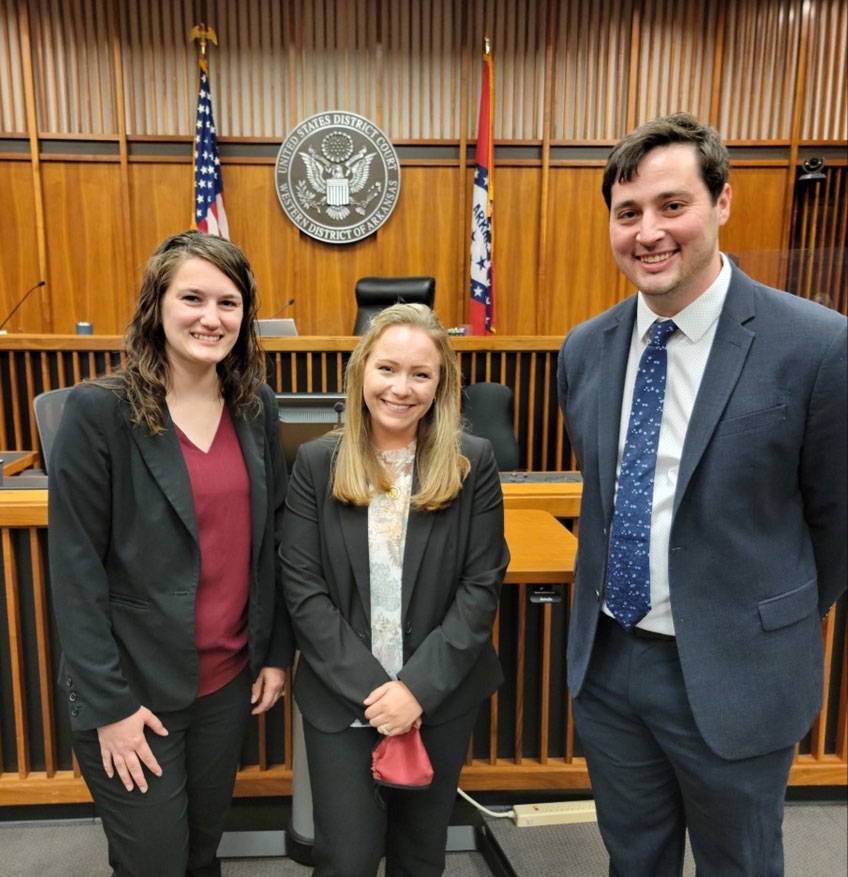Third-year law student Katie Sparrow delivered her first closing argument to a jury in U.S. District Court in the Western District of Arkansas at the end of a three-day trial in September 2021. Sparrow, along with other students enrolled at the law school's Criminal Practice Clinic, were able to return to courtrooms and represent numerous clients in state and federal courts as COVID-19 protocols were lifted.
Criminal Practice Clinic was appointed by the court to represent their client months after he initially filed suit pro se. Clinic students and faculty spent months litigating his case, including reopening discovery, deposing witnesses, conducting research and engaging in motion practice. Their client ultimately prevailed on his claim that a local police department violated his civil rights by using excessive force when its officers arrested him.
Alicia Canfield, 2021 School of Law graduate and former clinic student, continued her work on the case and served on the trial team along with Sparrow and visiting associate professor and supervising attorney Matt Bender.
"Going to the client's neighborhood, sitting on his family's couch or visiting with one of his neighbors on their porch were unforgettable experiences," Canfield said. "I also enjoyed getting the chance to cross-examine witnesses during the trial for the first time."
The neighbor she visited during the clinic's investigation became important in the case — she was the first witness called and Canfield's first direct examination during a jury trial.
"Having the opportunity to summarize the client's story in front of the jury and watch the jury come back in his favor is an experience I will never forget," Sparrow said after the trial. "I am beyond grateful for all that I got to experience in the clinic."
Third-year law student Taylor Carpenter continued the clinic's civil rights work and handled the litigation of a person's claims of Eighth Amendment violations and successfully obtained a favorable settlement for the client in early April 2022.
In addition to civil rights litigation, students stayed busy helping clients in criminal matters throughout Arkansas. Clinic students Caleb Epperson, Dana McGee and Marcus Clouse helped a local unhoused man charged with felony arson finally get released from jail.
Hannah Malone and Dalton Cook, both third-year law students, spent much of the spring semester preparing a case for trial, including reviewing stacks of medical records, meeting with expert witnesses and handling other pre-trial litigation activities. Malone and Cook were presented the school's Clinical Team of the Year Award for their work on the case.
"Working on a case where the consequences for a person are so serious is nerve-wracking, but the chance to work on a case like this was incredible," Cook said.
Reflecting on complex strategic decisions the team had to make in the case, Malone said, "We had to take all of these competing ideas and try to figure out how a jury would see them."
In April 2022, Malone and Cook briefed and successfully argued their motion to suppress a confession in state court.
"The opportunity to argue and win such a critical motion on Y-felony case is incredible experience for students," Bender said. "Attorneys wait years to get a chance to argue suppression issues in high stakes cases, so it is extraordinary for Hannah and Dalton to get a favorable result. … This highlights the quality of their advocacy."
The law school Legal Clinic was first directed by then-professor Hillary Rodham Clinton in 1975 to give students hands-on skills training by representing real clients in real-life legal situations, and to provide a free and much needed service to Northwest Arkansas. Clinic students practice law under the close supervision of a full-time faculty member. Learn more about the training and experience offered to students in the School of Law Legal Clinics and the critical legal services the program provides to the community.
About the School of Law: The law school offers a competitive J.D. as well as an advanced LL.M. program, which are taught by nationally recognized faculty. The school offers unique opportunities for students to participate in pro bono work, externships, live client clinics, competitions, and food and agriculture initiatives. The school strives to identify, discuss, and challenge issues of race, color, ethnicity, and the impact(s) they have on students, faculty, and staff members in an effort to achieve a diverse, inclusive, and equitable community. From admitting the Six Pioneers who were the first African American students to attend law school in the South without a court order to graduating governors, judges, prosecutors, and faculty who went on to become President of the United States and Secretary of State, the law school has a rich history and culture. Follows us at @uarklaw.
Topics
Contacts
Yusra Sultana, director of communications
School of Law
479-575-7417, ysultana@uark.edu
